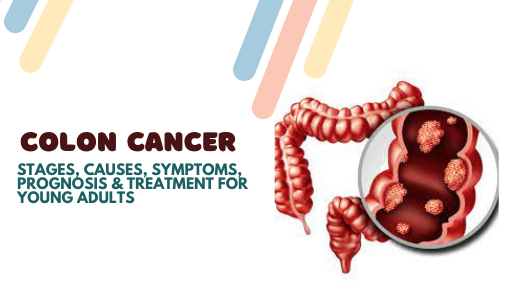-

Colon cancer stages
If one has been diagnosed with colon cancer, the doctor’s recommended test for you to determine the stage of cancer. Staging helps to determine treatment appropriate for the patient.
Staging tests include abdominal, pelvic and chest CT scans imaging. In most cases, the stage is fully determined until colon cancer surgery has not taken place.
The stages of colon cancer range from 0 to IV(Roman Number), the lowest stages indicate limited lining inside of the colon. In stage IV, the cancer is stated to be advanced and metastasized to other parts of the body.Colon cancer causes
The exact reason for colorectal cancer is not still defined, but certain factors that influenced the disease include the diet of the person, eating tobacco, smoking & heavy usage of alcohol. Also, there are certain hereditary cancer syndromes of family history that are at high risk to develop the disease.
Why is colon cancer on the rise in young adults
It is still not known why colorectal cancer is rising, especially among young people. The reason is unhealthy lifestyle, weighty and overweightness, smoking, alcohol use, eating low-fiber, high-fat dietary in processed meats, and some environmental factors that can be related to the disease. Family history of colorectal cancer or polyps, and conditions such as inflammatory bowel disease are also risk factors.
The reason for colon cancer is also suspected in people's genetics. The common genetic is associated with colon cancer is Lynch Syndrome which involves tumors.Colon cancer symptoms in young adults
- A insistent change in bowel habits, diarrhea or constipation, or the consistency of your stool
- Rectal bleeding/blood in your stool
- Persistent discomfort in the abdominal like cramps, gas or pain
- A sensation that the bowel is not completely empty
- Faintness or exhaustion
- Weight loss
Many people do not have any symptoms in the early stages of cancer. While symptoms may vary depending on the size and location of cancer in your large intestine.Risk of colon cancer by age
Age. The risk factor of colorectal cancer gets higher as people get older. Colorectal cancer may occur in young adults and teenagers, but a major number of colorectal cancers occur in age older than 50. For colon cancer, the average age of men diagnosed is 68 and for women is 72.
Colon cancer in young adults prognosis
Dr. Ng conducted a study of survival period among 514 individuals who were less than 50 years while 1814 patients were above the age of 50. These metastatic colorectal cancer patients participated in a clinical trial where a combination of chemotherapy & biologic therapy was tested.
These scientists find no noteworthy difference in survival rates between these two groups. The median survival of young colorectal cancer patients was 27.07 months vs. 26.12 months for the older group.
“This means that type of colorectal cancer in the younger patients is highly aggressive,” as per Elena A. Ivanina, DO, MPH, administrator of neurogastroenterology and motility at Lenox Hill Hospital in NY City.Colon Cancer Treatment
If there is colon cancer many treatments are there to control it, that includes surgery, radiation therapy, & drugs conducts, treatment such as chemotherapy, targeted therapy, & immunotherapy.
If cancer has grown through your colon, the surgeon may recommend:
- Partial colectomy. In this procedure, the surgeon may get rid of the part of the colon that poses cancer, along the margin of normal tissues. Your own reconnects you with the normal portions of the colon or rectum. This procedure is a minimally aggressive approach also called laparoscopy.
- Surgery that creates a way for leaving waste leaves of the body. If it is not possible to rejoin the strong portions of the colon you may require an ostomy. This includes an opening of the wall of the abdomen for the removal of stool in a bag that is secure over the opening.Mostly the ostomy is temporary, which allows the colon to heal after surgery. In a few cases, a colostomy is permanent.
- Lymph node removal. lymph nodes are removed in colon cancer surgery and are tested for cancer.Surgery for advanced cancer
If your cancer is metastatic, the surgeon may conduct an operation that dismisses blockage colon or that may improve symptoms. This surgery does not cure cancer, but indicates signs and symptoms, like blockage, bleeding, or pain.
In cases where cancer has reached the liver or lung but your health is good, the doctor may go for surgical treatment to remove the cancer. Chemotherapy can be done before or after in this procedure. This approach is to be free of cancer in the long term.
Chemotherapy
Chemotherapy uses drugs to destroy cancer cells. Chemotherapy for colon cancer is usually given after surgery if the cancer is larger or has spread to the lymph nodes. In this way, chemotherapy may kill any cancer cells that remain in the body and help reduce the risk of cancer recurrence.
Chemotherapy is used before an operation so that it shrinks large cancer, finally removed with surgery.
Chemotherapy is used to discharge symptoms of colon cancer that can be removed through surgery combined with radiation therapy.
For low-risk stage III colon cancer, a shorter cycle of chemotherapy afterward surgery is done. This approach removes side effects in comparison to the traditional.
Radiation therapy
Radiation therapy is a powerful source, like X-rays & protons, that can kill cancer cells. It can shrink large cancer immediately before an operation so that it may be removed easily.
When surgery is not an option, radiation therapy can be used to relieve symptoms. Sometimes radiation is given along with chemotherapy.
Targeted drug therapy
Targeted drug treatments work on precise abnormalities within cancer cells. Targeted drug treatments can lead to cancer cells dying.
Targeted drugs are given along with chemotherapy usually given in advance for colon cancer.
Immunotherapy
Immunotherapy is a drug treatment that helps the immune system to fight back cancer. Your body's immune system may not outbreak cancer as the cancer cells harvest proteins that blind immune system cells from spotting the cancer cells. Immunotherapy works interfere with that process.
Immunotherapy is usually kept for progressive/metastatic colon cancer. Your doctor may test your cancer cells to know if you are likely to respond to the treatment.
Regarded as the best hospital for colorectal cancer treatment in India, American Oncology Institute is a first of its kind dedicated center for the management of colorectal diseases. With internationally trained colorectal surgeons and organ-specific super specializations, we are the most preferred group of hospitals for colorectal surgery in India.
Our advanced and minimally invasive techniques lower the risk of complications as well as the amount of time needed to recover from colon or rectum cancer surgery.Why choose MH surgery?
It is regarded as one of the best colon cancer hospitals in Bangalore. MH surgery is one of its kind dedicated centers for colorectal diseases. It owns internationally qualified colorectal surgeons & organ-specific super specializations, it is most recognized hospital for colon cancer treatment in bangalore.
We have advanced & minimally invasive techniques that have reduced the risk for complications as well as faster recovery from colon and rectum cancer surgery.

Author: DR. MANJUNATH HARIDAS (MD FACS FICS)
Dr. Manjunath Haridas is one of the leading surgeons for Gastrointestinal Sciences in Whitefield, Bangalore. His area of expertise includes Gastrointestinal Surgery - Colon Rectum, Foregut Advanced Laparoscopic Surgery, and Minimally invasive surgery. He is Honored by the American Board of Certification, fellow Of the American College of Surgeons, SAGES membership and more.

